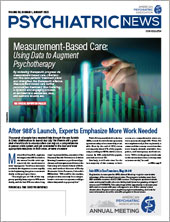The prevalence, morbidity, mortality, and costs of opioid use disorder have dramatically increased over the past 20 years. While there are several effective and evidence-based medications for opioid use disorder (MOUD), less than 20% of Americans with opioid use disorder receive MOUD. The inpatient general hospital setting represents a critical point of access to MOUD, given the significant medical comorbidities of patients with opioid use disorder and the increased time to engage patients in treatment, better monitoring capabilities, and opportunities to reduce the monetary impact of the disorder on the health care system.
Psychiatrists are an integral part of the hospital treatment team. However, they are often excluded for many reasons, including stigma toward opioid use disorder, lack of consultation-liaison (C-L) psychiatry services, and discomfort with managing opioid use disorder.
To help address this care gap, APA’s Council on C-L Psychiatry, in collaboration with the Council on Addiction Psychiatry, convened a multispecialty expert workgroup to prepare a resource document related to the medication treatment of patients with opioid use disorder. The workgroup discussed several barriers to medication treatment and factors limiting the involvement of psychiatrists in the treatment of opioid and other substance use disorders in the inpatient hospital setting. Among the barriers they identified were stigma associated with substance use disorders (SUD) and a knowledge gap among psychiatrists regarding SUD treatment. The workgroup then created a resource document that seeks to address these barriers and guide general psychiatrists.
The document includes an overview of OUD and its management in adults, explores the pharmacology of MOUD, describes barriers to care and specialty-specific concerns, and provides approaches to reducing stigma. The resource document also compares current medications to treat patients with opioid use disorder (naltrexone, buprenorphine, and methadone), walks psychiatrists through the medications’ initiation and titration in the general hospital setting, and provides recommendations on how to transition patients taking these medications from inpatient to outpatient settings.
The resource guide is designed to educate and empower psychiatrists to take a larger role in MOUD in the general hospital setting to save more lives at reduced cost. Psychiatrists are in a strong position to oversee the use of MOUD in hospital settings and are best equipped to lead MOUD treatment and reduce stigma, given our relative expertise in the area of SUDs, comorbid psychiatric illnesses, and harm reduction strategies. As such, it is important that psychiatrists stay up to date on evidence-based MOUD and work with other specialties to promote psychiatric involvement in the care of those with opioid use disorder in the general hospital setting. ■

